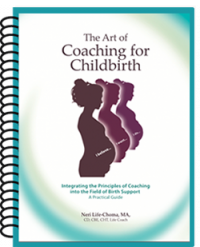
Decreasing Labor Induction Rates with Transformational Prenatal Coaching
Birth support pros have been led for decades to believe that informational and emotional support can reduce induction rates. This notion has been supported by certifying organizations, including Lamaze and DONA, and many others. Yet, induction rates have been on the rise since the ARRIVE study. So why are couples educated and informed about inductions, and the rates keep increasing? The common understanding is that decreasing labor induction rates belong to the broader discussion about couples’ informed consent. However, decreasing labor induction rates can be achieved only when we address expectant couples’ beliefs and ongoing need for reassurance of their and their babies health. Addressing the mindset and predetermined beliefs is achieved by Transformational Prenatal Coaching and not by informational and emotional support as previously thought by birth support pros.
What caused the dramatic increase in induction rates?
Labor induction rates have indeed increased over the past decade. Several factors led to this trend in birth management:
- Advanced maternal age leads to higher rates of medical conditions such as hypertension or gestational diabetes.
- Changes in medical practice:
- Not all doctors and midwives value and support normal physiological childbirth
- Scheduled inductions make it easier to manage large obstetrical practices. There has been a growing emphasis on close monitoring and managing pregnancies to ensure optimal outcomes, leading to more frequent recommendations for induction. In 2018, the ARRIVE study found that inducing low-risk, first-time mothers with accurately estimated due dates at 39 weeks may help to lower the cesarean rate from 22% to 19%. In addition, the researchers found no contribution of inductions relating to maternal and fetal death or severe childbirth complications. Yet, although the insignificant contribution of labor induction at 39 weeks to the reduction in cesarean rates, this finding was gladly adopted by the obstetric institute due to the intense public criticism of the high cesarean rates.
- Maternal request: Some women may choose to have a planned induction for personal reasons, such as convenience or logistical considerations.
Regardless of the reasons, decreasing labor induction rates must be on the radar of those who make efforts to facilitate empowering and positive childbirth experiences.
Couples’ beliefs about OBs’ authoritative knowledge and their continuous dependency on OBs to reassure them of their health, makes it impossible for them to negate induction
Birth support pros’ efforts to reduce induction rates
Birth support professionals have emphasized the quality of the birth experience and its emotional and developmental aspects. In the 90s, Penny Simkin’s study explored and analyzed the long-term impact of the birth experience on 20 women from the natural childbirth culture of the late 1960s and early 1970s. Women reported that their memories were vivid and deeply felt, and those with the highest satisfaction ratings felt they accomplished something significant, were in control, and shared that the birth experience contributed to their self-confidence and self-esteem. Since then, many studies have concluded that physiological birth is an intense and transformative psychological experience that empowers birth givers and should not be interrupted unless necessary. Birth support pros’ commitment to bringing birth givers’ experience to the fore and advocating for birth givers’ positive experience, in light of medical impositions and interventions, relied mainly on two practices: informing and advocating.
When labor induction is recommended, doulas and childbirth educators provide education and preparation, increasing couples’ knowledge about natural labor and various techniques to encourage labor to start. Additionally, doulas can offer emotional support to reduce stress hormones that interfere with the onset of labor. Finally, physical support can be provided during labor, potentially promoting the progression of labor. However, when couples face the imposition of an induction process, their beliefs about the authoritative knowledge of medical experts and their ongoing dependency on OBs reassure them of their health, creating a bias in their decision-making process that outweighs what they know, making it impossible for them to negate the induction. This understanding led me to develop the Transformational birth coaching approach. Nowadays, I hear daily from my students, who I train with transformational coaching techniques, that they finally have the strategies to address their clients’ beliefs and mindsets, leading them to make decisions that are aligned with their values, beliefs, and wants for their birth, and advocate for those in their communication with medical experts, especially in light of a potential deviation from their birth vision such as inductions.
The coaching exercises address individuals’ mindset; their predetermined belief in OBs authoritative knwoledge and the fears that guide their decision-making process about inductions
Medical authority still wins
A general overview of the medical tests and checkups commonly recommended during a healthy pregnancy reveals why despite our efforts, induction rates keep increasing. The checkups and tests an expectant person undergoes during pregnancy are quite extensive: The initial prenatal visit around 8-12 weeks is followed by a series of blood tests, urine tests, genetic screening, ultrasound scans, glucose tolerance tests, group B streptococcus (GBS) screening, and others. Throughout the pregnancy, birth givers undergo so many regular check-ups with a healthcare provider to monitor the progress of the pregnancy, assess maternal and fetal well-being, and address any concerns or questions. The frequency of these visits may increase as the due date approaches.
Mentally, these superfluous checkups can be quite overwhelming for a healthy person who rarely sees or communicates with doctors before their pregnancy. Pregnancy exams and checkups instill fear by constantly suggesting that something might be wrong with the pregnant person or their baby. This creates an ongoing dependency on external medical reassurance from a medical expert. Therefore, the common notion among birth support pros that with knowledge and advocacy, they can reduce the rates of medical interventions is far from the truth. As for advocacy, the common notion is that by discussing the birth givers’ preferences and helping them understand the benefits and risks associated with induction, we facilitate informed decision-making and encourage a shared decision-making process between the pregnant persons and their healthcare provider. However, if a pregnant person has been comforted and reassured about their health by a medical figure throughout their pregnancy, they are unlikely to stop doing so when the reassuring expert recommends an induction.
How Transformational Prenatal Coaching prevents labor induction
Transformational birth coaching addresses expectant persons’ mindsets, fears, and deep beliefs. In addition to a set of powerful and result-oriented coaching questions that help expectant persons reveal their fears, limiting beliefs, and perspectives that don’t serve them and even block their power to achieve their desired experiences, I have developed coaching exercises that address individuals’ mindset; their need for external reassurance and the predetermined beliefs that guide their decision-making process about inductions. Transformational coaching helps clients in various coaching fields to find their internal authority and align their beliefs and actions with their desired experiences, and transformational birth support coaches have successfully achieved these coaching goals with expectant individuals, leading them to their desired experiences. To learn more about the transformational birth and postpartum coaching philosophy and strategies, I invite you to read my BLOG, join my private Facebook group, and follow me on Instagram.
- Pushing Back or Empowering Clients? Discover Five Prenatal Coaching Strategies to Shift from Resistance to Confidence - November 2, 2025
- The Body is Ready, The Baby is Spun… What About Your Clients’ Mindset - August 27, 2025
- Agency in the Perinatal Journey: A Win for Clients — And for You - July 1, 2025
childbirth education, healthy birth, hospital birth, medical interventions in childbirth


